Key Takeaways:
- Dental assistant degree holders can pursue various roles in dental offices, clinics, and specialty practices. Common responsibilities include patient care, assisting dentists during procedures, and performing administrative tasks.
- Advanced certifications can lead to specialized roles in orthodontics or oral surgery.
- Career advancement opportunities include roles such as dental office manager, dental sales representative, or dental instructor.
- Dental assistants play a crucial role in maintaining patient comfort and ensuring the efficiency of dental practices. The field offers job stability and potential for career growth.
Dental assisting roles are essential to any functioning dental practice. Whether you’ve given your dental assistants any thought in the past or not, dental assistant roles can be a great career booster for the right candidates.
Typically dental assistants can begin their career with an associates degree and/or certification. Demand is high for qualified assistants nationwide, and can lead to a rewarding role. With the right experience and education, individuals can advance within their dental assistant career, or move to other related roles in the future.
Wondering what you can do with a degree in dental assistance? Keep reading below!
What is a Dental Assistant?
Dentistry is all about service. If you want to help people enjoy greater oral health — which in turn leads to a higher quality of life — dentistry might be the right path for you.
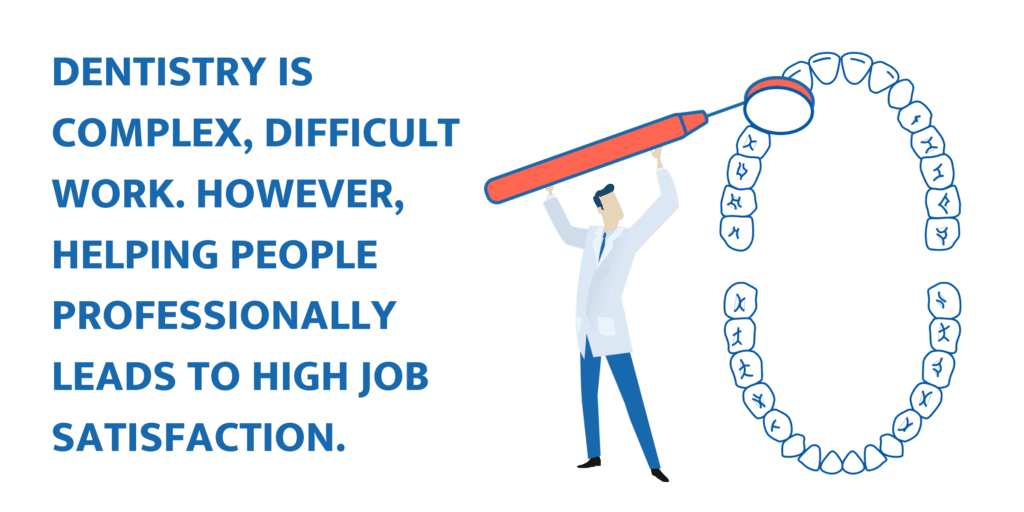
One of the drawbacks of entering a career in dentistry is the costs associated with training. Historically dentists could quickly pay off their educational debts, but dramatically increased tuition has severely altered that dynamic.
Dentistry is one of the most critical and oft-overlooked areas in health care. While becoming a Dentist or Dental Hygienist can take years of study and training, there’s a great way to enter the field quickly: working as a Dental Assistant. One considerable benefit of beginning a Dental Assistant program is the costs will be far lower than becoming a Dental Hygienist or fully licensed Dentist.
Dental Assistants help dental offices run efficiently by documenting and maintaining patient records. They help care for patients, including taking and recording x rays and whatever else hygienists and dentists ask them to do. They assist in scheduling, make and record appointments, and do other clerical work. Overall, Dental Assistants are utility players on a dental team, learning from those above them and doing whatever they can to aid their superiors.
Depending on the state you’re in, you might be able to start working as a Dental Assistant without any formal education or training. Instead, you’ll gain expertise on the job. In some states, you’ll be required to graduate from an accredited program, pass an exam, and get certified as a dental assistant. Make sure you check the requirements in your state to find out what you need to do to qualify.
What is a Dental Assistant Degree or Certification?
Assuming you need to complete a program in order to become a Dental Assistant, here’s some information about those programs:
Most Dental Assistant programs can be completed after high school. They generally take 9 to 11 months to finish but can take less in accelerated programs. Compare this to becoming a fully licensed dentist: you’ll need to spend 7-8 years learning and training. In some cases, Dental Assistant programs are offered part-time, making it easier to work and learn at the same time. There are distance education options for these programs as well.
How Do You Earn One?
Dental Assistant programs can be found at vocational schools, community colleges, technical institutes, dental schools, and universities. Graduates will usually receive a certificate.
Some of the courses you’ll likely study in these programs include:
- Anatomy and Physiology
- Dental Head and Neck Anatomy
- Intro to Dentistry
- Dental Materials
- Dental Specialties
- Medical Emergencies
- Dental Practice Management
- Dental Science
- Dental Radiology
- Dental Health Education
- Clinical Assisting
- Assistant Dental Terminology
- Among others.
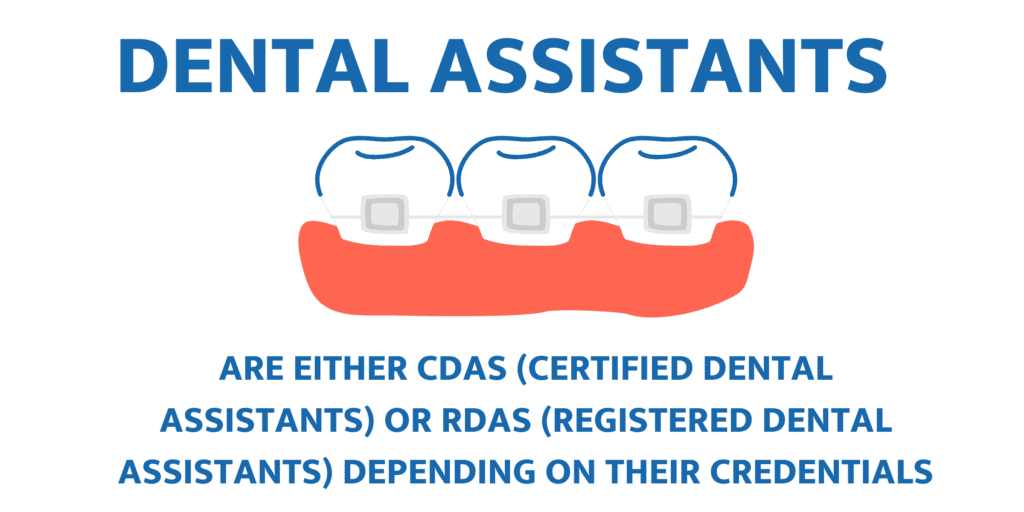
When you complete one of these programs, your next step might include getting official certification. To earn the national certification, you’ll take the certified dental assistant exam offered by the Dental Assisting National Board (DANB). This Certified Dental Assistant (CDA) examination is made up of:
- General Chairside Assisting: 120 questions (1.5 hours of testing).
- Radiation Health and Safety: 100 questions (1.25 hours of testing).
- Infection Control: 100 questions (1.25 hours of testing).
To qualify for the exam you’ll need to meet one of the following qualifications:
- Graduate from a CODA (Commission on Dental Accreditation) accredited dental assisting or dental hygiene program and hold a current CPR certification from a DANB (Dental Assisting National Board) approved provider.
- Hold a High School Diploma, work at least 3,500 hours in dentistry, and hold a current CPR certification from a DANB approved provider.
- Have been previously certified by the DANB or graduate from a CODA-accredited Doctor of Dental Surgery (DDS) program or a Doctor of Medicine in Dentistry (DMD) program or graduate from a comparable degree program outside of North America. You’ll also need a CPR certification in good standing from a DANB approved provider.
Let’s take a look at some sample questions indicative of what you might face on the CDA exam:
- 1) Which of these is not located in oral cavities:
- A) Gingiva B) Hard Palate C) Frenum D) Pterygoid process
- 2) Which of the following would be least likely to be found on the clinical examination form?
- A) Dates of tooth extractions B) Information on Crowns or Bridge Work C) Dates of loss of primary teeth D) TMJ evaluation
- 3) Which of these vitals signs would cause concern during dental treatment
- A) Blood pressure of 140/90 mm Hg B) Respiratory rate of 18 breaths per minute C) Pulse of 70 beats per minute in adults D) Oral temperature of 99°F
- 4) How often should patients be asked to update their medical and dentist history?
- A) At each visit B) Annually C) Only when something changes D) Every 6 months
- 5) What is the right-handed operating zone from 4 o’clock to 7 o’clock called?
- A) Operator zone B) Static zone C) Transfer zone D) Assistant’s zone
And here are the answers to these questions. See how you did!
- 1) D) Pterygoid process
- 2) C) Dates of loss of primary teeth
- 3) A) Blood pressure of 140/90 mm Hg
- 4) A) At each visit
- 5) C) Transfer zone
Earning a DANB certification can lead to $2 per hour higher pay, and more generous employee benefits, like paid time off. You’ll likely be more confident and knowledgeable when you’re applying for jobs. CDAs report higher levels of career satisfaction.
Of course, not all Dental Assistants are nationally certified. Those that only satisfy state requirements to become a Dental Assistant are called Registered Dental Assistants (RDAs). This might be the route for you, but remember CDAs enjoy higher pay, job security, and more job opportunities.
Depending on the program you complete, you may be able to transfer credits towards an associate or baccalaureate program. Some of the benefits of working as a Dental Assistant include:
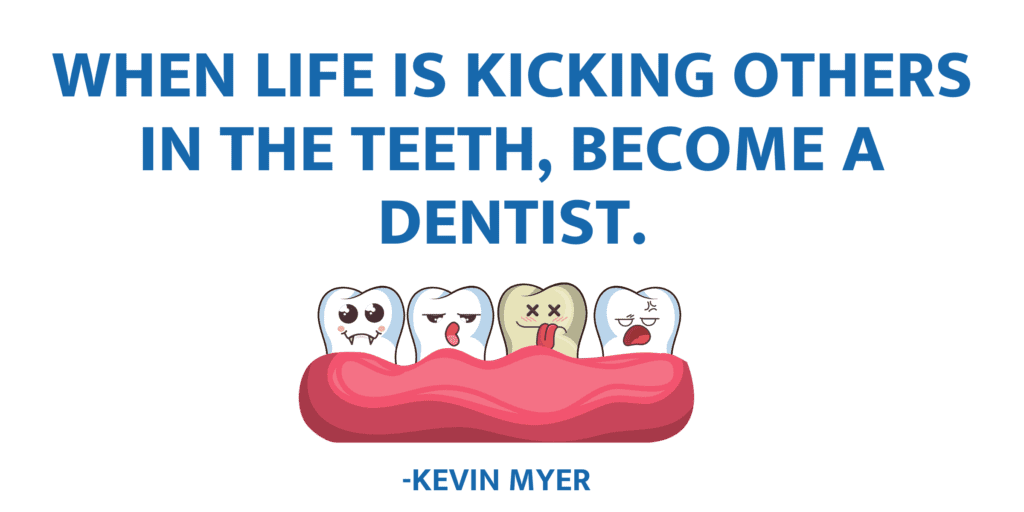
- Stable employment
- High demand for qualified workers
- Career advancement opportunities
- Better than average hourly wages
- Flexible hours
- Helping others
- Pleasant working environment
- Working in the growing health care field
Certified Dental Assistants work in settings like:
- Dental offices
- Hospitals
- Group practices
- Insurance companies
- Dental suppliers
- Dental manufacturing companies
- In the armed services and for the government
- Educational institutions
- Public health facilities
- Hospital dental clinics
Let’s take a look at some of the other certifications and another early role you can qualify for in the beginning of your dental career:
What About Working as a Dental Hygienist?
Becoming a registered Dental Assistant takes approximately 9 to 11 months of education and training from vocational or technical schools (give or take). Depending on the program you opt for, you can earn credits that would transfer to an associate degree in dentistry. However, you might want to consider pursuing an associate degree in dentistry to become a registered Dental Hygienist off the bat.
How much do dental assistants make? Dental Hygienists earned a median wage of $74,820 in May 2018. That’s almost twice as much as the median wage for most Dental Assistants (more on that later). By going to school for an extra year+ you can gain many marketable skills in dentistry and access this much higher pay.
Some Dental Hygienist responsibilities include:
- Examining patients
- Cleaning teeth
- Providing overall dental care
It’s not uncommon for a Dental Hygienist to have a Bachelor’s degree, but the entry-level education requirements for dental assistant jobs are associate degrees. Many dental hygienists or assistants will go on to dental school.

What are Certifications that Can Improve Your Early Dental Career?
If you’d rather become a Dental Assistant, here are some certifications that can supplement your training, leading to more job opportunities, greater responsibilities, and higher wages. They are all offered by the DANB:
- Certified Orthodontic Assistant (COA): Covers orthodontic assistance and controlling infections.
- Certified Preventive Functions Dental Assistant (CPFDA): Focused on coronal polish, topical fluoride, and sealants.
- Certified Restorative Functions Dental Assistant (CRFDA): Deals with anatomy, physiology, morphology, impressions, sealants, isolations, temporaries, and restorative functions.
- National Entry Level Dental Assistant (NELDA): Proves competencies in morphology, physiology, anatomy, infection control, and radiation health and safety.
Remember, these are all supplementary to becoming either an RDA or CDA. Some professional development programs may be offered by your local or regional dental examiners board. That can be a great place to search for job openings as well.
Now let’s inspect the responsibilities and duties you can expect to take on as a Dental Assistant:
What do Dental Assistants Do?
Dental Assistants are vital to the operation of dental practices and other related facilities.
Specific Dental Assistant responsibilities include:
- Sterilizing instruments: tools used in a dental office need to be cleaned after dental procedures (if they’re not discarded entirely).
- Prepping treatment areas: Dentists require clean rooms that are laid out with the tools they’ll need for patient care, such as oral and maxillofacial surgery. As a Dental Assistant, you’ll be responsible for preparing these areas before patients enter them.
- Educating patients: Patients often need to be taught basic tasks like the proper way to brush or floss. You can be responsible for demonstrating proper oral hygiene process as a Dental Assistant.
- Prepping dental insurance claims: Most patients will have some form of dental insurance. Dental Assistants assist or process dental insurance claims to make sure their practices are paid for the work they do. You may also need to make patient appointments and know how to protect the patient’s medical history. Scheduling appointments is usually an office assistant’s job, but some dentists offices are too small for those extra roles. Assistants often do both office and laboratory duties.
- Exposing, processing, and displaying x-rays: Patients often have x-rays taken to facilitate treatment and figure out what problems they’re facing. Dental Assistants are often expected to take x-rays accurately and show them appropriately to patients and dentists alike.
- Fabricating mouth guards: Sometimes, dental patients need mouth guards made that are molded to fit their teeth and gums. You may be asked to do this.
- Performing lab processes: Dental assistants perform lab processes like making casts of patients’ teeth or developing dental radiographs. In your training to become a Dental Assistant you’ll often do lab work to prepare you for this and other lab tasks.
- Removing sutures: Sutures, or stitches, are sometimes used to close wounds in the mouth. As a Dental Assistant, you might need to take these out safely and effectively.
- Placing sealants: Sealants are thin, plastic coatings that are painted on the chewing surfaces of teeth to prevent decay.
- Taking impressions: A dental impression is an imprint of teeth and gums in the mouth. Dental impressions are used to make casts or models.
- Placing and removing surgical and periodontal dressings: After some procedures, patients will need dressings to protect surfaces of surgical (or other wounds) sustained during procedures.
- Applying topical anesthetics: Specific areas in the mouth must be numbed for some procedures.
- Applying fluoride: Fluoride is used to strengthen enamel and prevent cavities and other forms of tooth decay.
- Preparing teeth for bonding: Before bonding materials are applied to teeth they must be roughened with conditioning gels that you might apply as a Dental Assistant
- Taking and recording vital signs: Like any form of health care, patients must have their vital signs like pulse and blood pressure taken routinely to ensure they’re healthy and can undergo specific procedures. Dental assistants often perform this duty.
- And anything else you’re asked to do. Entry-level dental assistants may have to do some jobs no one else wants!
Of course, dental assistant skills include lots of soft skills like calming patients. Making them feel comfortable in the dental chair prepare patients for their exam. Dental assistants typically have good interpersonal skills. Even the best dental assisting program can’t teach that.
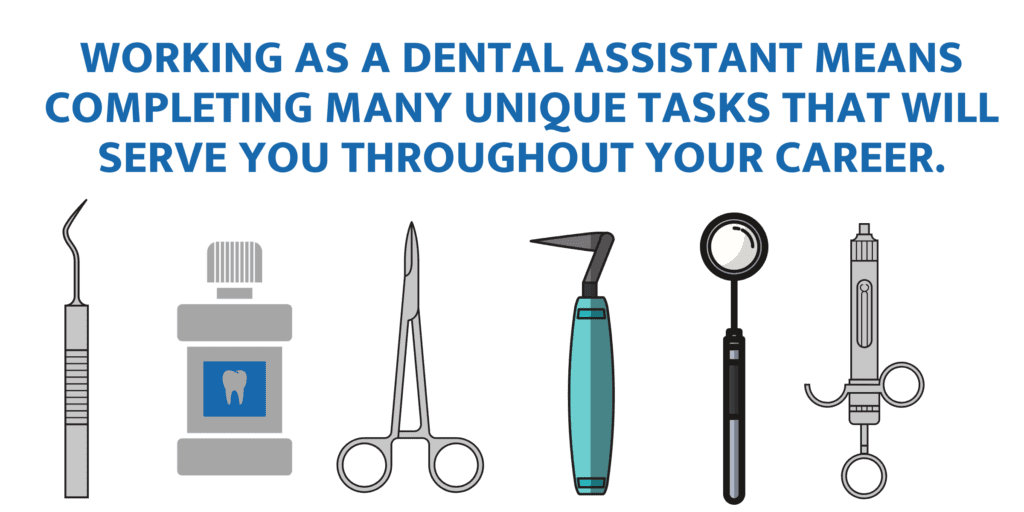
As you can see, Dental Assistants are incredibly versatile. Learning on the job and taking on all of these responsibilities can give you the invaluable experience you’ll apply throughout your career in dentistry and other areas of health care.
Let’s look at how you’ll decide whether to become a Dental Assistant and choosing between programs:
Ask Yourself and Consider the Following About Your Dental Assistant Education and Career
- Are you prepared to work in the service of others? Can you deal with being on your feet constantly, and handling a diverse set of responsibilities?
- Talk to anyone you know in dentistry and gain whatever insights you can about the field.
- What do you want to accomplish in your career? Is becoming a Dental Assistant a step in the right direction?
- How long can you commit to a Dental Assistant program daily, weekly, and overall until it’s completed? Some programs take longer than others. Make sure you understand what you’re getting into before you begin one of these programs.
- Remember: becoming a Dental Assistant takes less time than other roles in dentistry, but it might be worth it to spend extra time in training and education to improve your career credentials and prospects.
- How much can you afford to pay for a Dental Assistant program? How much would you have to borrow?
- Different programs have different costs. Best practices for borrowing money include taking public loans over private ones whenever possible.
- Make sure any program you’re considering is properly accredited. If you’re not sure, ask someone who knows.
- Where do you want to live and work during and after your Dental Assistant training?
- Some states and cities have higher pay for Dental Assistants (more on that in the final section).
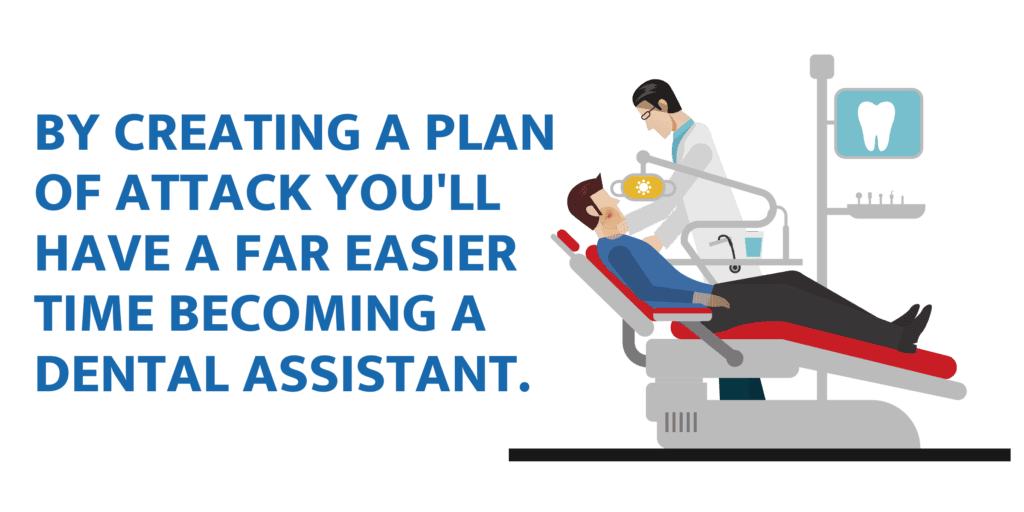
These are just some of the questions you should ask yourself. Write out answers to these and how they apply to specific programs to help you narrow down your search. Now let’s look at what we’ve done to help you in dentistry or a health care career.
How Can We Help You In Your Dentistry and Health Education and Career?
Here at Best Health Degrees, we’ve worked hard to help you get a career in health care, no matter what that might mean for you. We’ve ranked degree programs, prepared resources to help you decide where you belong, and answered common questions describing roles in the field.
Rankings
- 25 Best Master’s in Healthcare Administration
- 15 Best Online Master’s in Healthcare Administration
- 15 Best Online MSN Degree Programs
- 15 Best Master’s in Nursing and Healthcare Informatics
- 15 Best Online BSN Degree Programs
- 25 Best Traditional BSN Degree Programs
- 25 Online Master’s in Nursing and Healthcare Informatics
Resources
- What Can I Do with a Bachelor’s in Nursing?
- What Can I Do with a Master’s in Health Informatics?
- What Can I Do with a Master’s in Healthcare Administration?
- What Can I Do with a Master’s of Science in Nursing?
Common Questions
- How Do I Become a Dentist?
- How Do You Become a Dental Hygienist?
- Is An Associate’s Degree in Healthcare Worth It?”
- What is a Nursing Assistant?

What’s Dental Assistant Employment Like?
Before we end the guide let’s take an in-depth look at Dental Assistant pay and employment:

Dental Assistants help dentists and other dental employees in many ways. They take care of patients, take x rays, help make and organize patient records, assist in scheduling, and do other clerical tasks.
As previously mentioned, to become a dental assistant in some states, you’ll need to graduate from an accredited program and pass a test to become a Dental Assistant. In others, there are no formal education requirements, and you’ll just need to start working and receive on-the-job training.
Dental Assistants can eventually become dentists, and while they work as assistants, they can gain valuable skills and experiences that will serve them in dental careers. They can do networking that leads to more advanced dentistry work at the practices they work at, or at others. Most importantly, Dental Assistants can discover whether dentistry is right for them without committing the time and money they’d need to become a dentist or technician.
What Can You Expect to Earn as a Dental Assistant?
Let’s take a look at dental assistant earnings and employment. All of the information presented below is courtesy of the United States Bureau of Labor Statistics:
- In 2018, Dental Assistants earned a median wage of $38,660 annually, or $18.59 per hour.
- In 2018 there were 346,000 of these positions.
- Dental Assistant positions were predicted to jump by 11% between 2018-28, creating 38,700 new roles.
- The highest 10% of Dental Assistants earned over $54,800 in May 2018, and the lowest 10% made less than $26,940 annually.
- Working for the federal government was associated with higher Dental Assistant earnings.
- The vast majority of people in this field work in a dental office.
What’s are the Current Trends in Dental Assistant Employment?
Here’s some information about where Dental Assistants have high employment numbers, and where they’re paid the most:
The states with the highest level of employment for Dental Assistants are:
- California: 53,110 jobs, annual mean wage $41,030
- Texas: 30,290 jobs, annual mean wage $36,820
- Florida: 19,180 jobs, annual mean wage $39,590
- New York: 19,110 jobs, annual mean wage $39,130
- Illinois: 12,820 jobs, annual mean wage $39,370
The states and areas with the highest pay for Dental Assistants are:
- Minnesota: 5,730 positions, annual mean wage $49,880
- District of Columbia: 540 positions, annual mean wage $49,220
- New Hampshire: 1,340 positions, annual mean wage $48,760
- Alaska: 1,110 positions, annual mean wage $47,330
- North Dakota: 780 positions, annual mean wage $46,640
The predicted job growth for Dental Assistants is much faster than the average expected job growth for positions across the economy. BLS notes the aging population, and research linking oral health with general health will drive the demand for more preventive dental services across the country.
On behalf of everyone at Best Health Degrees, we hope you’ve found this guide informative and inspiring. Again, if you find any educational program through our content or in your general search for a dental assistant position, it’ll be very helpful to reach out to their staff directly. By building a rapport, you can improve your chances of acceptance, practice networking, and ask specific questions. You’ll also get a better sense about whether you’re a good fit for this work.
Also please remember to check in with us for new content about many different roles in the health field.
Good luck!
Related:
What Can You Do with a Human Service Degree?
What are the Best Master of Health Science Jobs?